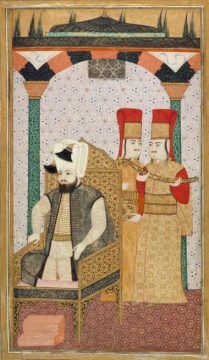Christopher de Bellaigue in The Guardian:
 In 1534 an Ottoman delegation was in Paris to discuss a plan to unite France and Turkey against their shared enemy, the Habsburg empire. That François I should lavish courtesies on infidel diplomats was bitterly resented by French Lutherans, who were being persecuted after the “affair of the placards”: a scandalous denunciation of the Catholic mass had been discovered pinned to the door of the royal bedchamber; the Turkish visitors were escorted past pyres that would be fed by Protestant heretics. A decade later the Franco-Ottoman alliance was so fixed a part of the European scene that François allowed a Turkish fleet under Hayreddin Pasha to winter in Toulon, the Mediterranean port having been emptied of its Christian inhabitants. The church bells were silenced and cantatas in the cathedral gave way to the call to prayer.“Looking at Toulon,” remarked an eyewitness after the Ottoman sailors had settled in, “you would say that it was Istanbul, with great public order and justice.”
In 1534 an Ottoman delegation was in Paris to discuss a plan to unite France and Turkey against their shared enemy, the Habsburg empire. That François I should lavish courtesies on infidel diplomats was bitterly resented by French Lutherans, who were being persecuted after the “affair of the placards”: a scandalous denunciation of the Catholic mass had been discovered pinned to the door of the royal bedchamber; the Turkish visitors were escorted past pyres that would be fed by Protestant heretics. A decade later the Franco-Ottoman alliance was so fixed a part of the European scene that François allowed a Turkish fleet under Hayreddin Pasha to winter in Toulon, the Mediterranean port having been emptied of its Christian inhabitants. The church bells were silenced and cantatas in the cathedral gave way to the call to prayer.“Looking at Toulon,” remarked an eyewitness after the Ottoman sailors had settled in, “you would say that it was Istanbul, with great public order and justice.”
Much of Europe affected to be scandalised by the alliance of France’s “very Christian king” with Sultan Suleyman I, the “Magnificent”, whose aim was to make Muslim Turkey the continent’s superpower. But as Noel Malcolm explains in Useful Enemies, the alliance was only the most overt of the accommodations that Europeans made after the Ottomans first exploded into the Balkans in 1362.
More here.
